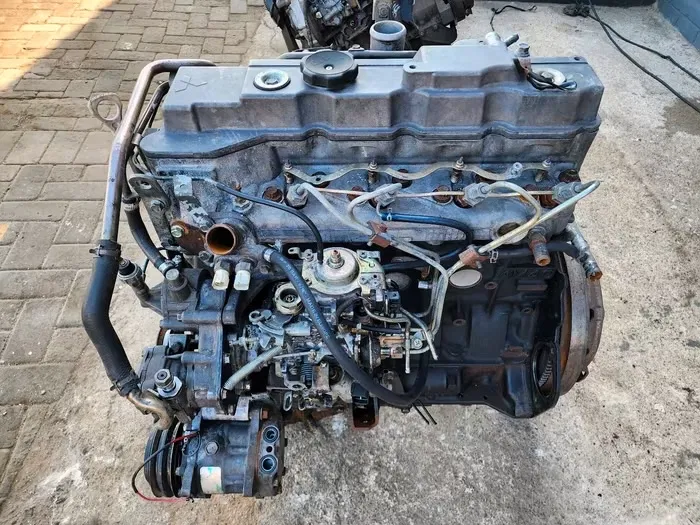Characteristics of the 4M40 engine
| Parameter | Value |
|---|---|
| Manufacturing | Kyoto engine plant |
| Engine make | 4M4 |
| Years of production | 1993-2006 |
| Cylinder block material | Cast iron |
| Engine type | Diesel |
| Configuration | Ready |
| Number of cylinders | 4 |
| Valves per cylinder | 2 |
| Piston stroke, mm | 100 |
| Cylinder diameter, mm | 95 |
| Compression ratio | 21.0 |
| Engine displacement, cc | 2835 |
| Engine power, hp/rpm | 80/4000, 125/4000, 140/4000 |
| Torque, Nm/rpm | 198/2000, 294/2000, 314/2000 |
| Environmental regulations | – |
| Turbocharger | MHI TF035HM-12T |
| Motor weight, kg | 260 |
| Fuel consumption, l/100 km (for Pajero 2) | |
| – city | 15.5 |
| – highway | 10.7 |
| – mixed. | 12.5 |
| Oil consumption, gr./1000 km | to 1000 |
| Engine oil | 5W-30, 5W-40, 10W-30, 15W-40 |
| How much oil in the engine, liters | 6.5 |
| Oil change is carried out, km | 15000 (better 7500) |
| Engine operating temperature, deg. | 90 |
| Engine life, thousand kilometers | – (in practice), 400+ (in practice) |
| Motor installed | Mitsubishi L200/Triton, Mitsubishi Pajero, Mitsubishi Pajero Sport/Challenger, Mitsubishi Delica |
Reliability, problems and repair of the 4M40 engine
In 1993, the car Mitsubishi Pajero of the 2nd generation received a new diesel engine 4M40. This motor was conceived as a replacement for the 4D56, but it so happened that they were produced in parallel. Here is applied in-line 4-cylinder cast-iron cylinder block with two balancer shafts. Inside the block is installed forged crankshaft with a stroke of 100 mm, piston diameter 95 mm, their compression height 51.6 mm. As a result, this provided 2.83 liters of displacement.

On top of the block is an 8-valve aluminum head with a single camshaft and swirl combustion chambers. The intake valves are 41mm in diameter, the exhaust valves are 35mm and the valve stem diameter is 8mm.
Adjustment of 4M40 valves is required after every 15 thousand kilometers. On a hot engine, the clearances are as follows: inlet valves 0.25 mm, exhaust valves 0.35 mm.
The timing drive uses a two-row chain, it serves about 250-300 thousand kilometers.
Initially there was a version with mechanical fuel injection, with a turbine MHI TF035HM-12T and intercooler, which developed 125 hp at 4000 rpm, torque 294 Nm at 2000 rpm.
In May 1996, the production of diesel 4M40 with EFI began, which developed 140 hp at 4000 rpm, and torque increased to 314 Nm at 2000 rpm.
Starting in 1999, the 4M40 engine was smoothly displaced by the 3.2-liter 4M41, and in 2006 this process was completely completed.
Mitsubishi 4M40 diesel engine problems and disadvantages
- Noise, ringing. There is a high probability of stretching the timing chain, for mileage under 300 thousand kilometers it is a normal phenomenon. It is necessary to change it before it is torn.
- Cracks in the cylinder head. Typical disease 4M40, if you have gases in the expansion tank, then this trouble did not pass you by. In these cases, it is better to buy a whole head than to weld your own.
- Won’t start, stalls. Often the problem is in the oil seal of the fuel injector, which needs to be replaced, and you also need to look at the return valve.
The resource of the 4M40 turbine is about 300 thousand kilometers. About once a year you need to clean the EGR valve, otherwise everything is clogged with carbon deposits, the car smokes and works, not as it should. Often after the first cleaning of the EGR, owners simply silence it.
Nevertheless, with regular maintenance and the use of good fuel and oil, the motor is not bad and quite reliable, the resource of 4M40 can easily exceed 400 thousand kilometers.
Engine tuning
Chip tuning
Unfortunately (or fortunately) no one is engaged in chip-tuning of this motor, which means that you will not be able to add power by a simple trip to the tuning office. There are turbo kits on sale, but it is a waste of money. The only sensible option to increase power is to buy a more powerful car.
MOTOR RATING: 4+
